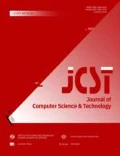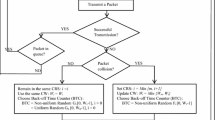Abstract
Previous researches have shown that Distributed Coordination Function (DCF) access mode of IEEE 802.11 has lower performance in heavy contention environment. Based on the in-depth analysis of IEEE 802.11 DCF, NSAD (New Self-adapt DCF-based protocol) has been proposed to improve system saturation throughput in heavy contention condition. The initial contention window tuning algorithm of NSAD is proved effective in error-free environment. However, problems concerning the exchanging of initial contention window occur in error-prone environment. Based on the analysis of NSAD’s performance in error-prone environment, RSAD is proposed to further enhance the performance. Simulation in a more real shadowing error-prone environment is done to compare the performance of NSAD and RSAD and results have shown that RSAD can achieve further performance improvement as expected in the error-prone environment than NSAD (i.e., better goodput and fairness index).
Similar content being viewed by others
References
IEEE 802.11. Wireless LAN medium access control (MAC) and physical (PHY) layer specifications. August 1999.
Peng Y, Wu H, Cheng S, Long K. A new self-adapt DCF algorithm. Global Telecommunications Conference, GLOBECOM’02, IEEE, Volume 1, Nov. 17–21, 2002, pp.87–91.
Peng Y, Cheng S. Design of a robust self-adapt DCF-based protocol. Global Telecommunications Conference, GLOBECOM’03, IEEE, Volume 1, Dec. 1–5, 2003, pp.200–204.
Banchs A, Pérez X. Providing throughput guarantees in IEEE 802.11 wireless LAN. IEEE Wireless Communications and Networking Conference, Volume 1, 17–21 March 2002, pp.130–138.
Peng Y, Wu H, Long K, Cheng S. Simulation analysis of TCP performance on IEEE 802.11 wireless LAN. In Proc. 2001 — Beijing. 2001 Int. Conf. Info-tech and Info-net, Volume 2, Oct. 29–Nov. 1 2001, pp.520–525.
Cali F, Conti M, Gregori E. IEEE 802.11 protocol: Design and performance evaluation of an adaptive backoff mechanism. IEEE JSAC, 2000, 18(9): 1774–1786.
Bianchi G. Performance analysis of the IEEE 802.11 distributed coordination function. IEEE JSAC, 2000, 18(3): 535–547.
The Network Simulator. http://www.isi.edu/nsnam/ns/.
Fall K, Floyd S. Simulation-based comparisons of Tahoe, Reno, and SACK TCP. ACM Computer Communication Review, 1996, 26(3): 5–21.
Jain R. The Art of Computer System Performance Analysis. John Wiley & Sons, 1991.
Author information
Authors and Affiliations
Corresponding author
Additional information
Supported by the National Natural Science Foundation of China under Grant Nos.90204003 and 60432010, the National High Technology Development 863 Program of China under Grant Nos.2001AA112071, 2001AA121052 and 2002AA103063, the National Basic Research 973 Program of China under Grant No.2003CB314806; Research Fund for the Doctoral Program of Higher Education (RFDP) of China under Grant No.20010013003; China Postdoctoral Science Foundation under Grant No.2003034111.
Rights and permissions
About this article
Cite this article
Peng, Y., Cheng, SD. & Chen, JL. RSAD: A Robust Distributed Contention-Based Adaptive Mechanism for IEEE 802.11 Wireless LANs. J Comput Sci Technol 20, 282–288 (2005). https://doi.org/10.1007/s11390-005-0282-z
Received:
Revised:
Issue Date:
DOI: https://doi.org/10.1007/s11390-005-0282-z




